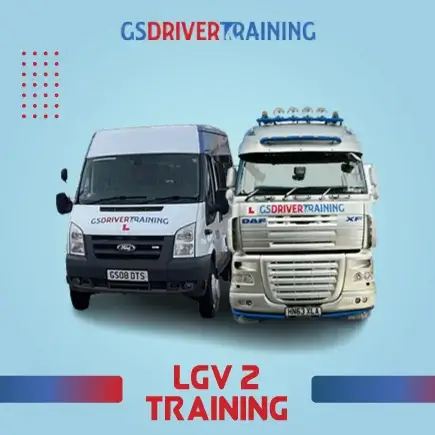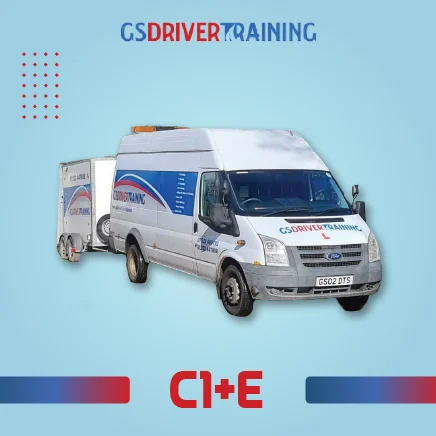
Despite the fact that failing your HGV driving exam can be discouraging, there is still hope. Actually, it's a chance to develop and enhance your driving abilities. Your chances of succeeding on your next try can be greatly increased by addressing the causes of your failure and taking proactive measures. If you recently failed your Surrey HGV driving exam, what should you do next?
Have you ever thought about how failing your HGV driving test could pave the way for your eventual success?
HGV Training Key Takeaways
Seek Additional Training: Join in driving classes that can meet your needs.
Reflect and Learn: Understand what is working and what is not going to be right during your test experience.
Set Realistic Goals: To improve and prepare a perfect plan should be created.
Engage in Mock Tests: Make sure to Practice in a test-like environment.
Recognising the Typical Causes of HGV Driving Test Failure
If you don't pass the HGV driving exam, you may start to doubt your driving skills. Your initial step towards improvement, though, may be to comprehend the typical causes of these failures.
Clear and preventable errors cause many candidates to fail. Although failing the Heavy Goods Vehicle (HGV) driving test can be discouraging, your journey is not over. This is a thorough guide about what to do next:
Now Understand the Reasons for Failure
Get Feedback: In order to find the exact reason behind your failure, get the feedback from your examiner. So that you can focus on your weak points to improve.
Common Reasons for Failure: Common causes include improper road sign following, poor hazard perception, and insufficient vehicle control.
Reflect and Reassess
- Self-Correction: Analyse your performance where you are good at and what you have to improve.
- Stay Positive: In the first attempt a lot of candidates face failure, so be motivated.
Get the Additional Training
- Extra Lessons: Think about enrolling in extra classes with a qualified teacher who can assist you in addressing the particular areas in which you require development.
- Practice: Invest more time on the skills that you find difficult.
- Provisional Licence: Your temporary licence should be valid. It is required before you start practicing or taking any driving exam.
Understand the Study and Preparation Process
Theory Revision: Review your study materials and take practice exams if you have trouble with the theoretical portion.
Practical Skills: Put your attention on useful abilities like reversing, navigating confined situations, and reading traffic signs.
Learn About Mental and Physical Practice
Stay Calm: Get enough sleep and rest so you can be relaxed and stress free on the day of your test. and you will perform actively.
Health Check: Check your physical fitness that you are capable of driving. If you have any issue, immediately try to resolve it.
Booking a Retest
Timely Rebooking: Schedule your next exam as soon as possible. If you take too much time, your skills may deteriorate.
Financial Planning: Make sure you have enough money for both the retest price and extra classes.
Support Systems
Instructor Guidance: Collaborate closely with your teacher to get ongoing advice and comments.
Peer Support: Speak with other HGV drivers who have completed the procedure. They can provide insightful counsel and motivation.
Understand What is Legal and Safety
Follow to Regulations: Try to focus on following all safety rules and requirements. This involves understanding the rules about duty and rest hours for HGV drivers.
What are the Practical Tips for Retaking the Test
Mock Tests: To get used to the exam pressure take practice tests in a final exam-like environment.
Driving Routes: Understand the routes that are often followed while testing.
Time Management: Manage your time while the test effectively so that you will not have to rush or delay.
Learn the Long-Term plans
Continual Learning: Even after you pass, keep learning and honing your driving techniques. You will become a more capable and safe driver as a result.
Advanced Courses: To improve your abilities and become a better HGV driver, think about enrolling in advanced driving classes.
The Important Resources
Driving Schools: Enrol in respectable HGV driving schools that provide thorough instruction and assistance.
Online Forums and Groups: Participate in online HGV driver forums and organisations to exchange advice and experiences.
DVSA Resources: Make use of the Driver and Vehicle Standards Agency's (DVSA) practice materials and guidelines.
HGV Theory Test: For your HGV theoretical test, prepare well. Follow the Highway Code and get comfortable reacting to signs.
Driver CPC Part: Get ready for the Driver CPC portion of your course.
Training Mentor: Collaborate closely with your mentor for training. They may provide you insightful criticism and help you identify your driving flaws, which will increase your pass percentage.
Car Driving Test: Think back on your prior experiences taking driving tests. This can lessen your nervousness and help you comprehend the format of the test. This will mitigate your nervousness and assist you to understand the test format.
Test Day Preparation: You should have all the necessary documents and a good night's sleep just before the test. check the details from your training institutes to ensure you have everything important.
Test Report and Test Result: Examine your exam report thoroughly after the test. Knowing your test result, whether you pass or fail, can assist you know how to do better on subsequent exams.
Vulnerable Road Users: During your practice and exam, pay close attention to road users who are at risk. Both cyclists and pedestrians are included in this.
HGV News: Keep abreast on the most recent HGV news. This can reveal information about any modifications to laws or testing protocols.
Highway Code: Examine the Highway Code on a regular basis. Both your theory and practical driving tests will require it.
Driving Faults: Recognise typical driving errors. Your training mentor can assist you in recognising these and offering preventative measures.
Roundabout Navigation: Since roundabouts are a frequent place for drivers to make mistakes, practise navigating them thoroughly.
Other Road Users: Keep other road users in mind at all times. You can drive more securely and confidently if you understand how they behave.
Pass Rate: Try to comprehend the elements that affect HGV drivers' pass rates and strive to become more proficient in them.
Identifying Typical Causes of HGV Driving Test Failure
Poor lane discipline is one of the most common problems that cause test failures. A serious flaw could be drifting between lanes or improper placement. Likewise, mishandling mirrors is another frequent cause of failure. Examiners commonly witness applicants failing to regularly or efficiently check their mirrors, which might result in hazardous circumstances.
Another dangerous flaw is inadequate observation at intersections. Missing approaching vehicles is one dangerous scenario that might arise from improper observation. Being aware of these typical errors can make you more careful the next time you try.
Finding Areas Where One's Driving Abilities Need to be Improved
Identifying the precise areas in which you failed is quite valuable. Maybe you had trouble reversing, or you had trouble reading road signs. Finding these areas of weakness is essential for focused improvement. Make a thorough list of all the errors you made during the exam to start.
Your practice sessions will be guided by this list, which will assist you in concentrating on the areas that require the greatest attention. Perhaps you could practise reversing and comprehending intricate road intersections more. A more sophisticated driving skill set is one step closer with each mistake that is discovered.
Looking for More Resources for Training and Assistance
After you've determined your areas of weakness, it's helpful to look for more guidance and assistance. This might originate from a variety of sources, such as expert training or neighbourhood resources that can provide support and guidance.
Get Additional Training Options
Think about taking advanced driving classes. These specific training courses can be quite beneficial. You might get the individualised feedback and direction you require in a one-on-one meeting with a certified instructor. This focused strategy can enhance your confidence while strengthening areas where you're having trouble.
An alternative viewpoint from a different instructor in the HGV training network can occasionally provide new information. Whether it's learning specific movements or enhancing your overall road awareness, they can assist you in comprehending complex nuances. Recall that spending money on these classes is an investment in your ability to drive safely in the future.
Making Use of Resources for Assistance and Direction
Never undervalue the strength of community support. There are several local support groups and internet forums where you may exchange stories and get priceless guidance. These forums are frequently populated by people who have encountered comparable difficulties and may have advice that examiners do not.
These materials can be very helpful in raising your spirits and providing you with the motivation you need to continue. Furthermore, listening to success tales can be energising and inspiring. By going over everything from how to pass the theoretical test to how to get the required score.
Considering Your Test Experience
A crucial component of learning and development is reflection.
First, consider your test objectively for a while. What went well? Where did things not go according to the plan? Putting your ideas down on paper can help you see what has to be improved. Perhaps you did a good job of handling the car, but you had trouble with some traffic situations or movements.
You can begin creating a more effective activity plan for your upcoming test by thinking about these things. The goal of this reflection is to use the outcome as a tool for improved readiness rather than to mope about failure.
Gaining Knowledge from Errors and Difficulties Encountered During the Test
Every error serves as a teaching moment. List the difficulties you encountered, such as manoeuvring around tight turns or efficiently checking your mirrors. Consider how you might approach these difficulties more skilfully the next time. Perhaps you need to practise more in real-world settings or switch up your approach.
If you struggle with anxieties, think about tactics like visualisation exercises or stress management. Have faith that every error will teach you something useful and make you a better driver.
Creating Realistic Aims for Retaking the Exam
While preparing for your next driving test it is crucial to set goals. In order to stay motivated and improve stability in your practice, your aims should be realistic and easy to achieve.
Creating a Schedule for Planning and Development
Making a timeline that is realistic is essential. Discuss your practice methods such as, any driving classes, practice sessions, and learning for the theoretical test. By following a clear timetable, you can enhance your driving skills and be prepared for the test day. Always include some extra time for any surprises or delays.
Make a Study method to enhance Your HGV Driving Capabilities
You can improve both skills, knowledge and driving just by a well planned study schedule. To be prepared well for a driving test It's important to balance both areas.
Developing a Methodical Study Schedule to Improve HGV Driving Abilities
A clear study plan is required for good preparation. Organise particular times to watch training videos, read knowledgeable materials and practice driving.
Including both Academic and Practical Elements in the Study Schedule
Make sure your study schedule is balanced by including both theoretical and practical components.
Practicing Mock Tests and Simulations
Practice regular mock tests are crucial because they create real-test like environment pressure and conditions. They help to identify the area that you require to improve and build driving confidence.
Practical Driving Test: Practice driving test by paying full attention. Practice on public roads, negotiating roundabouts and understanding traffic signals. Your own reaction to indicators and to other driver’s actions should be observed by yourself.
Engaging in mock tests and simulations
You can significantly improve your exam preparation by taking practice exams. Try to replicate as much of the test environment as you can, including the paths and potential situations. Mock exams highlight areas that still require work and aid in your understanding of the test framework.
Getting Better by Practicing in test-like Settings
You can improve your performance considerably by simulating test situations. Practise while closely following the test procedures, with a friend or teacher serving as the examiner. This entails staying on the test routes and abiding by all the guidelines just like you would in the real test.
These practice sessions will help you maintain composure and focus while also boosting your confidence. You will get a little bit better at passing the real test with each practice exam.
Getting Input and Advice from Skilled Drivers
Experienced driver’s opinions can offer priceless insights that are not included in instruction manuals or textbooks. Their useful guidance can make it easier for you to handle challenging situations.
Seeking feedback from experienced drivers
HGV drivers with a lot of experience know a lot. Ask them for their opinions on your driving abilities and your weak points. They can provide advice that is essential in real-world driving situations but is frequently overlooked in official instruction.
Their knowledge can be very helpful when it comes to handling big cars or negotiating challenging intersections. Speaking with these seasoned drivers can help increase your confidence by providing moral support and encouragement.
Seeking Advice and Pointers from Experts on How to Pass the Driving Test
Professional drivers and instructors have a wealth of knowledge to offer when it comes to passing the HGV driving exam. Their advice, which ranges from precise tactics to general tips on maintaining composure under duress, can have a big impact.
Summary of Key Points
- Recognise the typical causes of not recognising your deficiencies.
- Examine your exam experience and note any areas that need work.
- Establish attainable objectives and a timetable for retaking the exam.
- Create a well-organised study schedule and take practice exams.
- Ask seasoned drivers for their opinions for helpful guidance.
Have you thought about how using this guidance to change your strategy can help you pass your next HGV driving test? Please feel free to comment below with your ideas and experiences.
How can I guarantee a high passing score on my theory and practical tests while preparing for my HGV training?
HGV Training:
Sign up for a respectable HGV training course. Make sure the training consists of both hands-on driving experience and classroom instruction. Practice on a regular basis is crucial. Spend enough time behind the wheel while being watched over by knowledgeable instructors.
Theory Test:
As soon as you feel prepared, schedule your theoretical test. To study, make use of official DVSA materials, applications, and internet resources. Pay close attention to road signage, driving laws, and the Highway Code. To familiarise yourself with the format, practice with practice exams.
Trainee HGV Drivers:
Utilise every resource at your disposal as a trainee HGV driver. Join discussion boards or social media communities to get assistance and guidance from more seasoned drivers and other trainees. Learn from other people's experiences and get any queries you may have answered.
Oncoming Vehicle:
Practice handling approaching cars during your hands-on training. Know how to drive safely on narrow roads and in confined spaces when there is approaching traffic.
Test Centre:
To obtain a sense of the place and its environs, visit the test centre in advance. On test day, this can lessen anxiety.
If at all possible, familiarise yourself with the path usually travelled during the test.
Signals:
Signal usage must be done correctly. Make sure you know how and when to utilise hazard lights, indicators, and other indications. Make signalling a habit by practicing it during all of your training sessions.
Test Pass Rates:
Examine the pass rates at various testing locations. Because to less crowded routes or more skilled examiners, some centres might have greater pass rates.
If at all feasible, pick a test centre with a high success rate, but make sure it's also at a handy location for you.
Book:
Think about spending money on an extensive HGV instruction manual. For both theory and practical exams, these publications frequently include thorough explanations, advice, and practice questions. Utilise the book to enhance your training sessions after reading it through in its entirety.
Frequently Asked Questions
On an HGV Driving Test, How many Errors are Permitted?
During your HGV driving exam, you are permitted to make up to 12 small mistakes but not any major or dangerous ones. If these limits are exceeded, the test will be deemed unsuccessful.
How Challenging is the HGV Test to Pass?
Because the HGV test demands a high level of competence and knowledge, passing it might be difficult. However, you can improve your chances of passing by being well-prepared, practicing, and having a solid grasp of the test criteria.
After Passing the HGV Test, What Should One Do?
Well done on passing the HGV exam. You must apply for your full HGV licence after passing. After that, you can begin searching for employment as a certified HGV driver.
What Occurs if my HGV Test is Unsuccessful?
Don't give up if you don't pass your HGV exam. You might reschedule your exam and focus on strengthening your weak points. Make use of the examiner's comments to improve your preparation for the subsequent try.
Also Read: How to Update the Address on Your HGV Driver Licence
Online Transport Manager Exams Now Available
How to Get an HGV Licence with GS Driver Training if You Live in Addlestone, Surrey








